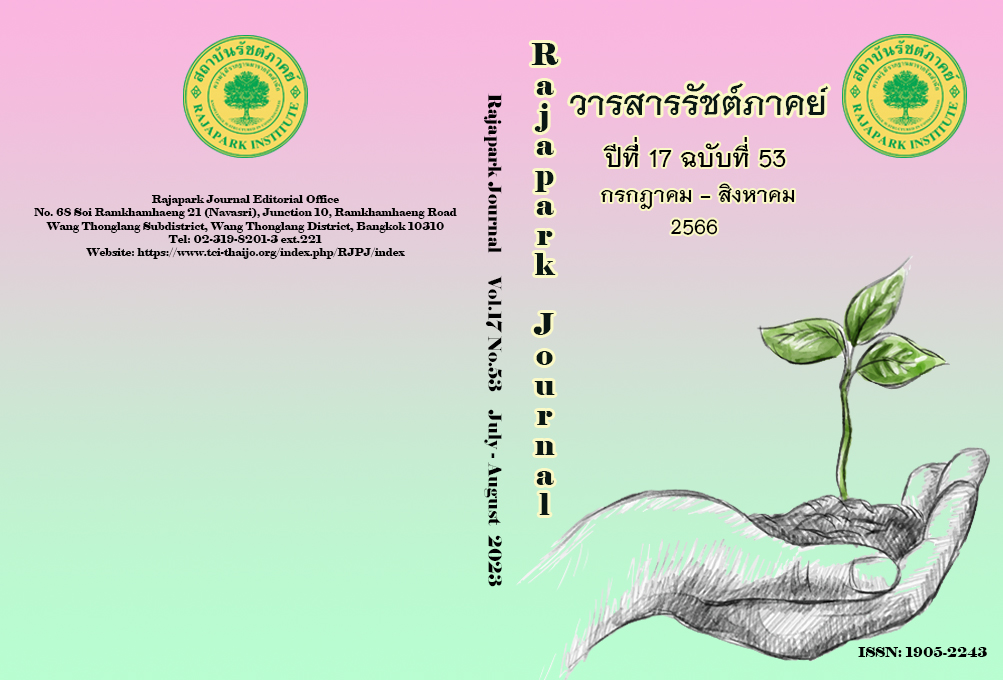Relationship Between Relationship Stress and Work Attitude and the Performance of Personnel, A Case Study of Investigative Officers of the Metropolitan Police Division, Royal Thai Police
Main Article Content
Abstract
The purpose of this research was to study the performance and factors directly and indirectly affecting the performance of investigating officers of the Metropolitan Police Division, Royal Thai Police, by random sampling from 413 investigators of the Metropolitan Police Division 9, using multistage random sampling. The questionnaires were tested for credibility by Cronbach. The statistics used for data analysis and hypothesis testing were descriptive statistics and structural equation model analysis. The findings showed that 1) the performance of the investigative officers of the Metropolitan Police Division was high at the overall level. They paid more attention to performance based on roles than to performance beyond roles. 2) Factors directly influencing the results of the performance of investigative officers of the Metropolitan Police Division were stress at work, followed by work relations, work attitudes, and perceived organizational support; factors that indirectly influenced performance through the perceived organizational support were work relationships and work stress.
Article Details

This work is licensed under a Creative Commons Attribution-NonCommercial-NoDerivatives 4.0 International License.
Views and opinions appearing in the Journal it is the responsibility of the author of the article, and does not constitute the view and responsibility of the editorial team.
References
Abualrub, R.F. (2004). Job Stress, Job Performance, and Social Support Among Hospital Nurses. Journal of Nursing Scholarship, 36(1), 73-78. DOI:10.1111/j.1547-5069.2004.04016.x
Ahmed, A., & Ramzan, M. (2013). Effect of Job Stress on Employees of Performance: A Study on Banking Sector of Pakistan. Journal of Business and Management, 11(6), 61-68.
Al-Homayan, A.M., Shamsudin, F.M., Subramaniam, C., & Islam, R. (2013). Impacts of Job Demands on Nurses’ Performance Working in Public Hospitals. American Journal of Applied Sciences, 10, 1050-1060. https://doi.org/10.3844/ajassp.2013.1050.1060
Arshadi, N., & Hayavi, G. (2013). Effect of Perceived Organizational Support on Affective Commitment and Job Performance: Mediating Role of OBSE. Social and Behavioral Sciences, 84(1), 739-743.
Bashir, U., & Ramay, M. I. (2010). Impact of Stress on Employees Job Performance A Study on Banking Sector of Pakistan. International Journal of Marketing Studies, 2(1), 122-126.
Bin, A.S. (2016). The Relationship Between Job Satisfaction, Job Performance and Employee Engagement: An Explorative Study. Business Management and Economics, 4(1), 1-8.
Borman, W.C., & Motowidlo, S.J. (1997) Task Performance and Contextual Performance: The Meaning for Personnel Selection Research. Human Performance, 10, 99-109. http://dx.doi.org/10.1207/s15327043hup1002_3
Caillier, J. G. (2017). The Impact of High-quality Workplace Relationships in Public Organizations. Public Administration, 95(3), 638-653. https://doi.org/10.1111/padm.12328
Campbell, J. P. (1983). Some Possible Implications of “Modeling” for the Conceptualization of Measurement. In F. Landy, S. Zedeck, & J. Cleveland (Eds.), Performance measurement and Theory (pp. 277-298). Lawrence Erlbaum Associates.
Conway, J. (2011). Effects of Supervisor-employee Relationship on Job Performance. Department of Applied Psychology Steinhardt School of Culture, Education, and Human Development, New York University.
Denhardt, R. B., & Denhardt, J. V., & Aristigueta, M. P. (2009). Managing Human Behavior in Public and Nonprofit Organizations. Thousand Oaks, CA: Sage.
Fornell, C., & Larcker, D. F. (1981). Evaluating Structural Equation Models with Unobservable Variables and Measurement Error. Journal of Marketing Research, 18(1), 39-50.
Gerlach, G. I. (2019). Linking Justice Perceptions, Workplace Relationship Quality and Job Performance: The Differential Roles of Vertical and Horizontal Workplace Relationships. German Journal of Human Resource Management, 33(4), 337-362.
Jamal, M. (1984). Job Stress and Job Performance Controversy: An Empirical Assessment. Organizational Behavior & Human Performance, 33(1), 1–21.
Karatepe, O. M., & Aga, M. (2016). The Effects of Organization Mission Fulfillment and Perceived Organizational Support on Job Performance. The International Journal of Bank Marketing, 34(3), 368-387.
Krejcie, R. V., & Morgan, D. W. (1970). Determining Sample Size for Research Activities. Educational and Psychological Measurement, 30(3), 607–610.
Majule, A. N. (2017). The Influence of Supervisor Employee Relation on Employee’s Performance in the Hospitality Industry: The Case of Dar es Salaam[Unpublished Doctoral dissertation, Human Resource Management, Open University of Tanzania].
Mangkunegara, A.K. (2016). Company Human Resource Management. PT. Rosdakarya Youth.
Motowidlo, S. J., Borman, W. C., & Schmit, M. J. (1997). A Theory of Individual Differences in Task and Contextual Performance. Human Performance, 10(2), 71-83.
Muhammad, K., Toryila, A. S., & Saanyol, D. B. (2018). The Role of Interpersonal Relationship on Job Performance Among Employees of Gboko Local Government Area of Benue State, Nigeria. International Journal of Social Sciences and Management Research, 4(5), 67-74.
Office of the Civil Service Commission. (2010). Principles of Performance Management System. Office of the Civil Service Commission.
Panpluem, P., & Jadesadalak, W. (2017). The Influence of Justice in the Organization to the Performance According to the Role Through the Recognition of Support from the Organization. Innovative Distance Learning E-Journal, 7(1), 55-67.
Rahiman, H.U., & Kodikal, R. (2017). Impact of Employee Work Related Attitude on Job Performance. British Journal of Economics, Finance and Management Sciences, 13(2), 93-105.
Riketta, M. (2008). The Causal Relation Between Job Attitudes and Performance: A Meta-analysis of Panel Studies. Journal of Applied Psychology, 93(2), 472-481.
Scotter, V. (2000). Relationships of Task Performance and Contextual Performance with Turnover, Job Satisfaction, and Affective Commitment. Science Direct Human Resource Management Review, 10(1), 79-95.
Sonnentag, S., & Frese, M. (2002). Performance Concepts and Performance Theory. Psychological Management of Individual Performance. John Wiley & Sons.
Susanty, A., & Miradipta, R. (2013). Employee’s Job Performance: The Effect of Attitude toward Works, Organizational Commitment, and Job Satisfaction. Jurnal Teknik Industri, 15(1), 13-24.
Wangthanomsak, M. (2015). Stress the Manager. Journal of Educational Administration, Silpakorn University, 6(1), 293-305.
Yongxing, G., Hongfei, D., Baoguo, X., & Lei, M. (2017). Work Engagement and Job Performance: The Moderating Role of Perceived Organizational Support. Anales de Psicologia, 33(3), 708-713. DOI:10.6018/analesps.33.3.238571


